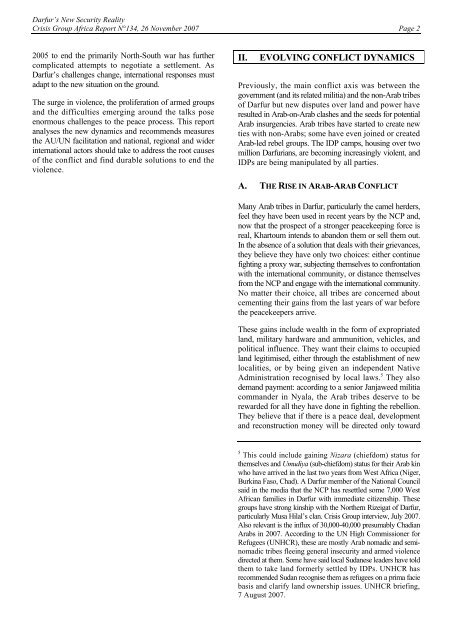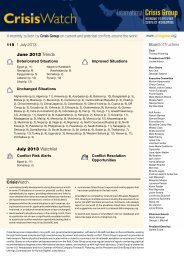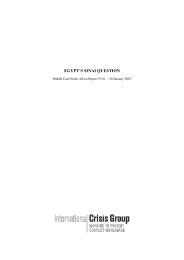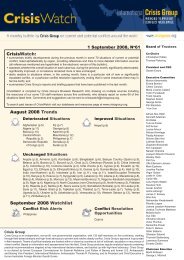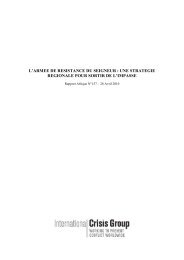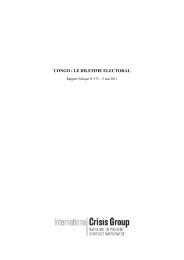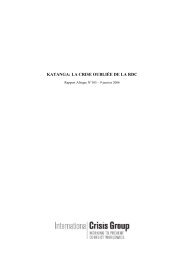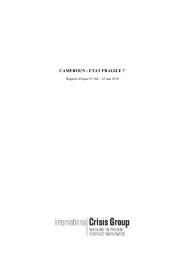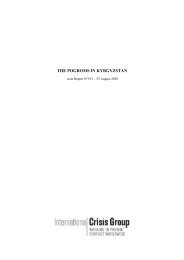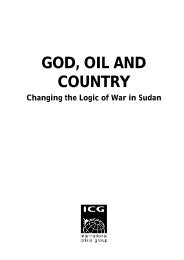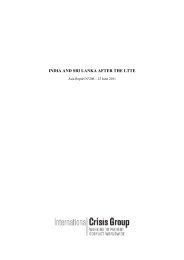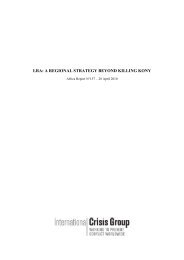sudan - International Crisis Group
sudan - International Crisis Group
sudan - International Crisis Group
You also want an ePaper? Increase the reach of your titles
YUMPU automatically turns print PDFs into web optimized ePapers that Google loves.
Darfur’s New Security Reality<br />
<strong>Crisis</strong> <strong>Group</strong> Africa Report N°134, 26 November 2007 Page 2<br />
2005 to end the primarily North-South war has further<br />
complicated attempts to negotiate a settlement. As<br />
Darfur’s challenges change, international responses must<br />
adapt to the new situation on the ground.<br />
The surge in violence, the proliferation of armed groups<br />
and the difficulties emerging around the talks pose<br />
enormous challenges to the peace process. This report<br />
analyses the new dynamics and recommends measures<br />
the AU/UN facilitation and national, regional and wider<br />
international actors should take to address the root causes<br />
of the conflict and find durable solutions to end the<br />
violence.<br />
II. EVOLVING CONFLICT DYNAMICS<br />
Previously, the main conflict axis was between the<br />
government (and its related militia) and the non-Arab tribes<br />
of Darfur but new disputes over land and power have<br />
resulted in Arab-on-Arab clashes and the seeds for potential<br />
Arab insurgencies. Arab tribes have started to create new<br />
ties with non-Arabs; some have even joined or created<br />
Arab-led rebel groups. The IDP camps, housing over two<br />
million Darfurians, are becoming increasingly violent, and<br />
IDPs are being manipulated by all parties.<br />
A. THE RISE IN ARAB-ARAB CONFLICT<br />
Many Arab tribes in Darfur, particularly the camel herders,<br />
feel they have been used in recent years by the NCP and,<br />
now that the prospect of a stronger peacekeeping force is<br />
real, Khartoum intends to abandon them or sell them out.<br />
In the absence of a solution that deals with their grievances,<br />
they believe they have only two choices: either continue<br />
fighting a proxy war, subjecting themselves to confrontation<br />
with the international community, or distance themselves<br />
from the NCP and engage with the international community.<br />
No matter their choice, all tribes are concerned about<br />
cementing their gains from the last years of war before<br />
the peacekeepers arrive.<br />
These gains include wealth in the form of expropriated<br />
land, military hardware and ammunition, vehicles, and<br />
political influence. They want their claims to occupied<br />
land legitimised, either through the establishment of new<br />
localities, or by being given an independent Native<br />
Administration recognised by local laws. 5 They also<br />
demand payment: according to a senior Janjaweed militia<br />
commander in Nyala, the Arab tribes deserve to be<br />
rewarded for all they have done in fighting the rebellion.<br />
They believe that if there is a peace deal, development<br />
and reconstruction money will be directed only toward<br />
5 This could include gaining Nizara (chiefdom) status for<br />
themselves and Umudiya (sub-chiefdom) status for their Arab kin<br />
who have arrived in the last two years from West Africa (Niger,<br />
Burkina Faso, Chad). A Darfur member of the National Council<br />
said in the media that the NCP has resettled some 7,000 West<br />
African families in Darfur with immediate citizenship. These<br />
groups have strong kinship with the Northern Rizeigat of Darfur,<br />
particularly Musa Hilal’s clan. <strong>Crisis</strong> <strong>Group</strong> interview, July 2007.<br />
Also relevant is the influx of 30,000-40,000 presumably Chadian<br />
Arabs in 2007. According to the UN High Commissioner for<br />
Refugees (UNHCR), these are mostly Arab nomadic and seminomadic<br />
tribes fleeing general insecurity and armed violence<br />
directed at them. Some have said local Sudanese leaders have told<br />
them to take land formerly settled by IDPs. UNHCR has<br />
recommended Sudan recognise them as refugees on a prima facie<br />
basis and clarify land ownership issues. UNHCR briefing,<br />
7 August 2007.


